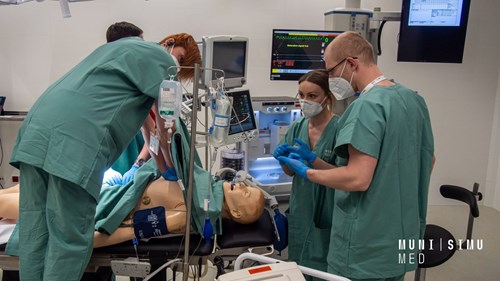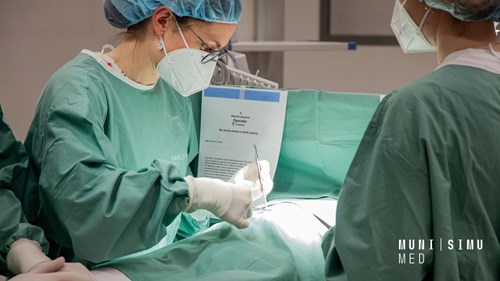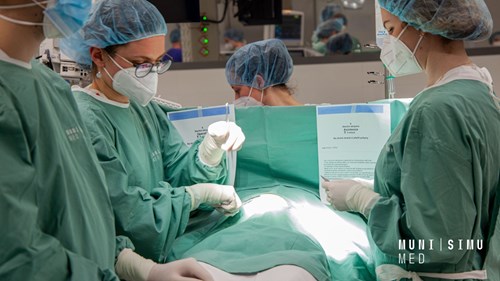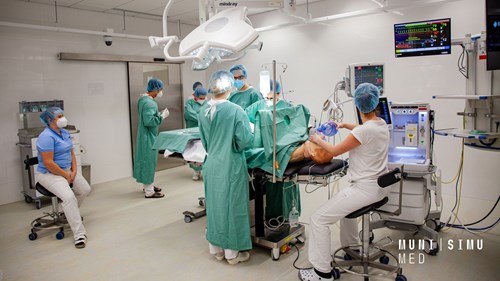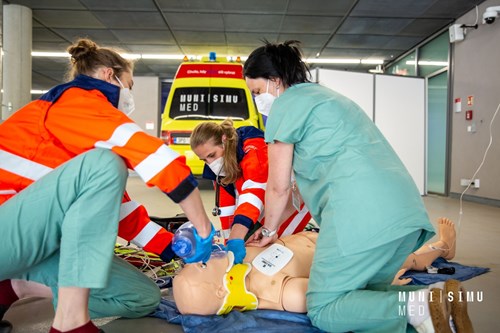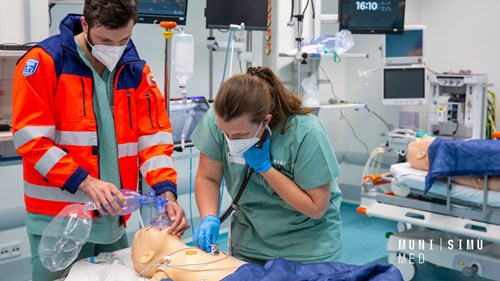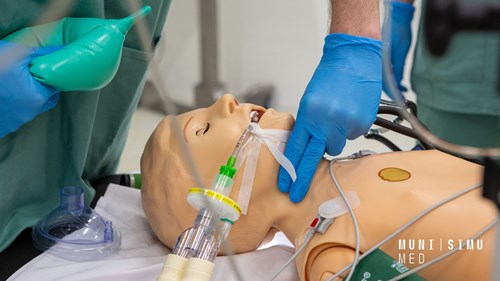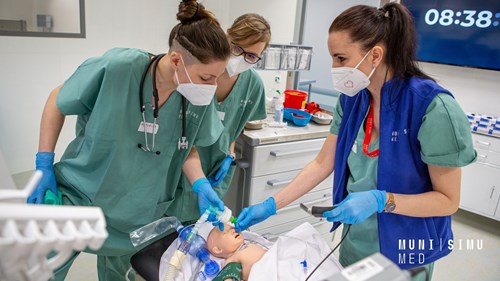
Interview: We’re Opening a New Doctoral Study Programme Healthcare Simulation
From September 2022, the FM MU will expand its offer of doctoral studies with a new study programme Healthcare Simulation that received accreditation in November 2021. It will be taught in both Czech and English. Students then can choose between 15 Czech and 15 English study programmes.

How and when did the idea of accrediting a new study programme come about and how did the whole process work? We asked prof. MUDr. Petr Štourač, Ph.D., MBA, the Vice-Dean for Development and Studies in General Medicine (Years 4–6) and Head of the Department of Simulation Medicine, and his deputy Assoc. Prof. MUDr. Martina Kosinová, Ph.D.
When did the idea of creating a new study programme Healthcare Simulation come about? Why was it accredited at the FM MU?
PŠ: We have been playing with the idea of expanding the field of simulations in medicine to include an academic and scientific dimension in the preparation and implementation of the FM MU Simulation Centre project since the very beginning, i.e. since 2014. As soon as the original, rather futuristic, idea was materialized in the current form of the building and the teaching, which has already been attended by almost 3500 students, started in October 2020, we dusted off the idea of further development of this relatively new scientific field. In May 2021, together with Martina Kosinová, we presented the faculty management with the vision to create a unique doctoral programme in the Czech and European context, focused on the issue of simulations in medicine, which would allow graduates of medical, healthcare and technical study programmes to continue their academic careers. Thanks to the support of the faculty and university leadership, we were able to receive accreditation for it in record time and we can look forward to our first Ph.D. students in the academic year 2022/2023.
Considering the fact that the Simulation Centre FM MU is unique in terms of its equipment and scope in the Czech and European context, the question arises, why wouldn’t this study programme be accredited here?
MK: The first ideas for the creation of a new doctoral study programme were born almost immediately after I learned about the establishment of a new academic department, the Department of Simulation Medicine at the FM MU. Logically, I immediately thought that there should be a possibility of further scientific development in this dynamically developing field. I was confirmed in this conviction by the fact that we were contacted by more and more students who were interested in the issue of simulations in medicine when considering their future scientific direction. For example, graduates in engineering or teaching. As these were not graduates of medical faculties, it was not appropriate for them to study e.g. in the Ph.D. programme in Anaesthesiology, Intensive Medicine and Pain Management. Therefore, we were looking for a way to enable their further academic growth. Petr Štourač and I both came up with the idea of accrediting a doctoral programme de facto simultaneously and independently, which strengthened our conviction that this was the right way to go... And it was.
The study programme is closely connected to the Simulation Centre and the newly established Department of Simulation Medicine at the FM MU, where most of the faculty's activities in the field of simulation medicine are concentrated. It is here that we are constantly trying to push the boundaries of simulation education not only within the Czech Republic but thanks to international cooperation we are also involved in setting new trends internationally.


How will the new Ph.D. programme be unique, who can apply?
MK: The newly accredited doctoral study programme is unique in that a similarly focused study programme enabling further education in the field of simulation in medicine directly at the medical faculty is not accredited anywhere in the world, or we are not aware of its existence yet. Its opening at the FM MU expands the potential for orientation towards clinical disciplines and practically oriented research directly linked to teaching. In contrast to traditional study programmes, healthcare staff, who are an indispensable part of multidisciplinary teams in the clinical environment, can continue their career development. Thanks to cooperation with other MU faculties and other institutions (e.g. Brno University of Technology), the study is also suitable for graduates of non-medical professions, for example biomedical engineers, information technology experts, etc.
PŠ: This Ph.D. programme will be unique in its multidisciplinary focus and grasp of the issue in its entire complexity. It will not only be aimed at graduates of medical degree programmes, but also at graduates of many other degree programmes in the biomedical and humanities (e.g. teaching) specialisation. High demands will be placed not only on students to understand the issues of simulation in medicine from the perspective of possible clinical application, but also from the perspective of modern pedagogy, technical support and further development of simulation education. However, the main added value for students will be the understanding of the scientific background of simulations and the possibility of further professional growth.
As the study programme is accredited in both Czech and English, we expect to see interest from foreign students in the future.
What will be the application of future graduates in practice?
MK: We are currently experiencing a boom in simulation medicine not only in the Czech Republic but also abroad. The development of simulation medicine has recently been substantially contributed to by the situation caused by the COVID-19 epidemic, when part of clinical teaching was moved from the environment of medical facilities to the form of simulated teaching, which enabled the preservation of medical teaching in the safe environment of the Simulation Centre FM MU. Simulation-based teaching and, for example, objective structured evaluation of clinical situations are gaining importance not only in undergraduate education, but especially in postgraduate and specialisation education, where they already are irreplaceable in many fields of education.
PS: Thanks to a great team of academics, developers and teaching methodologists, we are among the top in the field nationally. But we cannot get too complacent. Therefore, we are aware of the need to educate other skilled colleagues who will expand the team of the Department of Simulation Medicine of the FM MU or join the teams of simulation centres in our country or abroad. Without exaggeration, we believe that the future graduates of our Ph.D. programme will be recruited as managers of existing or newly established simulation centres. At the same time, future intellectual leaders who will continue to push the boundaries of the field should be nurtured.
